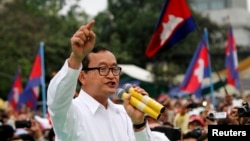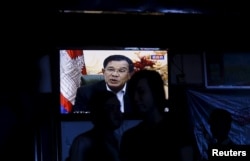Cambodia’s opposition leader, Sam Rainsy, is accusing the ruling party of carrying out a constitutional coup after a local court issued an arrest warrant for him and a parliamentary committed stripped him of his seat. In a message published on Facebook, the politician said the ruling party is taking measures to try to eliminate the country's main opposition party.
Opposition leader Sam Rainsy was originally scheduled to return to Cambodia late Monday after visits to Japan and South Korea, but he postponed his arrival after a court issued an arrest warrant for him on Friday, and a parliamentary committee controlled by the ruling party subsequently stripped him of his legal immunity and his seat.
Rainsy has yet to fix a return date.
On Wednesday, the Cambodia Daily newspaper reported that negotiations were underway to organize a deal between the opposition leader and strongman Prime Minister Hun Sen, who has ruled the country for three decades.
The standoff caps weeks of rising tensions between the ruling party and the opposition. Late last month the ruling Cambodian People's Party’s legislators voted to fire the opposition’s deputy head, Kem Sokha, from his parliamentary post.
Days earlier, a mob severely beat two opposition lawmakers when they left parliament, as police and security guards stood by. Later that day a mob attacked Kem Sokha’s private residence – the police ignored pleas for help from his wife who was trapped inside their home.
Many people believe the ruling CPP ordered the attacks, though a party spokesman denied that was the case.
Political analyst Ou Virak, the founder of the think-tank The Future Forum, said the current discord has strong echoes with the ruling party’s actions before the 2008 and 2013 general elections.
“It has worked magic in the past – so Hun Sen is looking at this as a page from an old playbook, and he’s definitely in some way is going back to the same tactic that has worked for him so cheaply, so easily, by just bringing legal charges with a court that he has full control over,” said Virak.
The opposition Cambodia National Rescue Party, or CNRP, stunned the ruling party when it came close to winning the 2013 general election – losing by just 300,000 votes, or around 4 percent of the electorate.
Virak said the ruling party realizes that its 2013 pledge to enact reforms is proving hard to carry out, which is why it is now trying to divide the opposition ahead of the 2018 ballot.
“After the 2013 election, which was a very, very close election, the CPP thought they can actually look at reforms and try to attract young voters. I think they’ve realized it’s actually much more difficult, particularly with an entrenched, corrupt system that they’ve built, that they have. So they are now resorting to old tactics, old dirty tactics, which is using the courts, which they have full control, to bring about legal harassment of Mr. Sam Rainsy, that has worked magic in the past and still works today,” he said.
Overnight, the spokesman for U.N. Secretary-General Ban Ki-moon described the arrest warrant against Rainsy and the earlier attacks on opposition MPs as “worrisome developments,” and urged both parties to resume talks.
It has been a difficult year for the opposition: 15 activists were jailed earlier this year after being convicted of insurrection, and a senator is currently awaiting trial on the charge of forging a public document. The cases against them are widely regarded as politically motivated.
The arrest warrant against Rainsy relates to a 2011 court decision in which he was found guilty in absentia of defamation and ordered to serve two years in jail after stating that Foreign Minister Hor Namhong helped to run a Khmer Rouge prison during Pol Pot’s brutal 1970s rule.
However that conviction was widely believed to have been quashed ahead of the 2013 election when Rainsy was issued a royal pardon, allowing him to return from exile to contest the vote.








